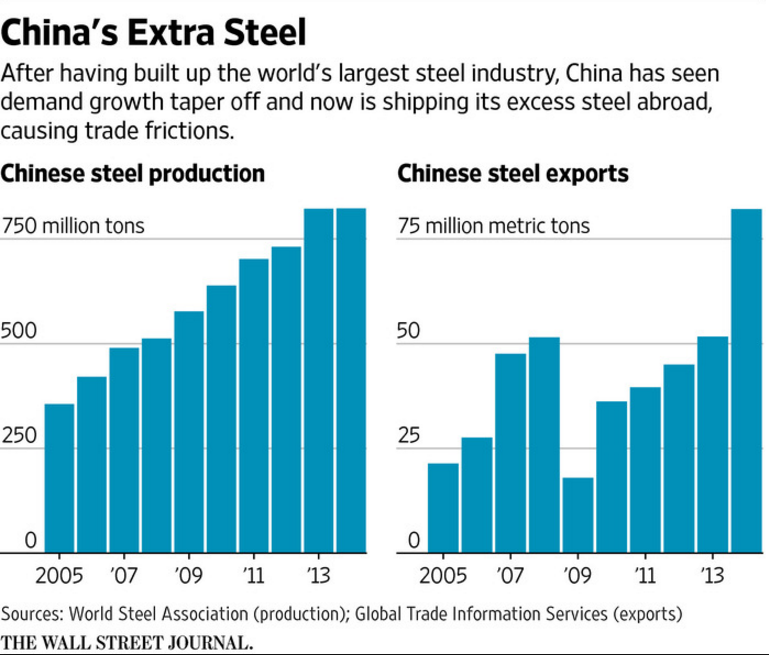
This FT article sounds like bad news, but in my view it’s just the opposite:
A deal announced on Friday by officials in Beijing and Washington was billed as “gigantic” and “Herculean” by his administration in its efforts to reset the relationship between the world’s two largest economies. It also marked a major de-escalation from Mr Trump’s bellicose campaign rhetoric and widespread fears that he might set off a trade war.
To some former US officials, Trump advisers, business executives and other close watchers of the US-China relationship, however, this was a poor deal in which Beijing had simply reheated old promises. They say it raises questions about the Trump administration’s strategic wherewithal and the very negotiating muscle the president has so often touted.
“This is disappointing on many levels,” says Dan DiMicco, former chief executive of US steelmaker Nucor and a campaign adviser to Mr Trump who has long advocated a tough approach on Beijing. “We are rewarding China before stopping their massive trade cheating.”
“They got played,” was the blunter assessment of one former US official.
When combined with the administration’s recent decision not to exit Nafta, it suggests that the pragmatists in the Trump Administration are gaining the upper hand.
In my view, there are two problems with Trump’s focus on “winning” trade battles. First, trade is a win-win proposition. And second, America’s size and power give it a lot of leverage in trade negotiations. Here’s the Economist:
WHEN, three days after his inauguration, Donald Trump pulled America out of the Trans-Pacific Partnership (TPP), a 12-country free-trade deal that his predecessor, Barack Obama, wanted to be his legacy in Asia, it was the fulfillment of a campaign promise. . . .
What a difference three months make. This week in Toronto, the surviving members–Australia, Brunei, Canada, Chile, Japan, Malaysia, Mexico, New Zealand, Peru, Singapore and Vietnam–met to discuss how to move the partnership forward without America. At the end of May, they will meet again for a more substantive gathering in Hanoi. There, bet on TPP confounding the undertakers and rising from the dead.
That may seem strange. After all, although Mr Trump convinced himself that TPP was lousy for America, it was the other members who had to make most of the “concessions” in terms of opening markets. They did so because the American market is a huge prize.
It’s probably just human nature to assume that you are being taken advantage of by foreigners. For instance, here’s Trump:
I don’t know who the people are that would put us into a NAFTA, which was so one-sided. Both from the Canada standpoint and from the Mexico standpoint. So one-sided. Wilbur [Ross, the secretary of commerce] will tell you that, you know, like, at the court in Canada, we always lose. Well, the judges are three Canadians and two Americans. We always lose. But we’re not going to lose any more. And so it’s very, very unfair.
And here’s the actual record:
The 35 claims brought against Canada comprise 45 per cent of the total number of claims under NAFTA. That’s significantly more than Mexico’s 22 or the 20 brought against the U.S.
Canada has lost or settled six claims paying a total of $170 million in damages, while Mexico has lost five cases and paid out $204 million. The U.S.,meanwhile, has won 11 cases and has never lost a NAFTA investor-state case.
HT: Matt Yglesias

READER COMMENTS
Philo
May 14 2017 at 12:54pm
“20 [claims have been] brought against the U.S. [in the 20-year period 1995-2015]. . . . The U.S. . . . has won 11 cases and has never lost a NAFTA investor-state case.” So the other nine cases are still pending? Or were some of them settled out of court?
Thaomas
May 14 2017 at 4:33pm
When one’s negotiating objective is damaging to one’s interests, it is good to “loose” the negotiation and get a “bad” deal. May May “have to” accept freedom of movement to retain access of UK to the EU Single Market. 🙂
Scott Sumner
May 14 2017 at 4:45pm
Philo, I’m not sure.
Thaomas, I agree.
Paul Geddes
May 15 2017 at 5:49am
The source (Canadian Centre for Policy Alternatives)for your information about Canada and NAFTA court cases is not credible. Instead, go to the main source: http://www.international.gc.ca and look for trade agreement disputes. The language is more lawyerly and less colourful than from your source but also less anti-trade. Because, wouldn’t it be great if NAFTA could free us from some of our over zealous environmental restrictions….
Bahrum Lamehdasht
May 16 2017 at 7:27am
Since Trump has taken over he has backtracked on all his promises, both political and economic. Whatever happened to his wall, for instance? It was inevitable that he would cave in to the Chinese during trade negotiations.
Comments are closed.